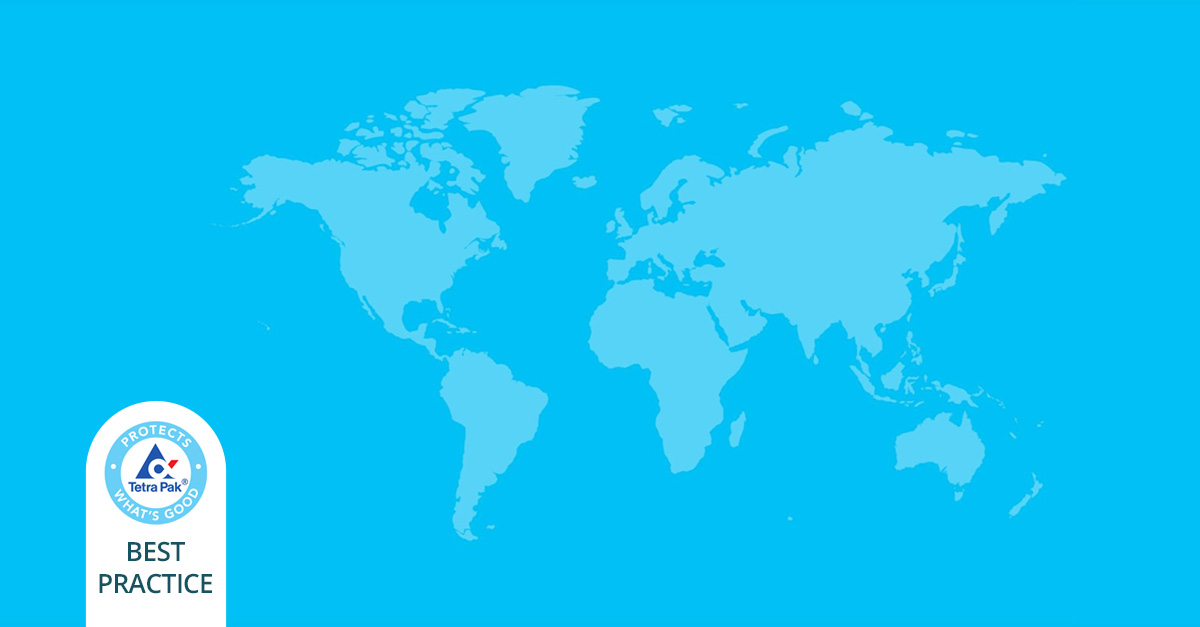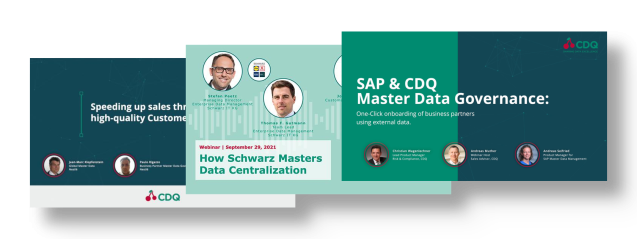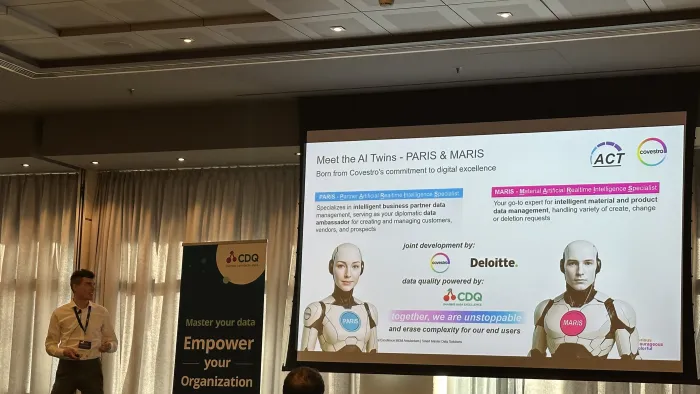Local needs, global excellence: Tetra Pak best practice approach

In a recent showcase at the CDQ Good Practice Award ceremony, Tetra Pak, a global leader in food processing and packaging solutions, shared invaluable insights into their exemplary approach to business data management. Best practice from the organization puts focus on data but also emphasizes democratization—making data available across the organization in various countries, locations, and functions.
Tetra Pak embarked on the data governance journey in 2006. The initial step involved establishing the foundational elements, such as identifying ownership, defining processes, conceptualizing data quality, establishing data definitions, and setting basic business rules. By 2013, Tetra Pak had successfully implemented master data governance, and in the same year earned recognition with the CDQ Good Practice Award.
The subsequent phase focused on optimization and automation. Tetra Pak implemented MDG workflow tool, addressing finance, material, and customer data. During this phase, the company introduced the concept of global Master Data Management (MDM), marking a shift from regional teams to a global approach. Quality and automation became increasingly applicable, setting the stage for the current phase—a period of preparation for SAP S/4HANA.
Exploring CDQ solution capabilities
Tetra Pak integrated CDQ services during a business transformation project that introduced Salesforce. The Get Clean capability of CDQ played a crucial role in assessing data duplication. This process, aligned with Tetra Pak's governance structure, significantly reduced the time spent on data cleansing, enabled Tetra Pak to identify and focus solely on real customers for migration to the new Salesforce environment.
The journey continued with a focus on assessing the capabilities of the CDQ solution. Tetra Pak explored groundbreaking features, such as obtaining data from external parties—an entirely new concept at that time. The team also delved into internal data improvement strategies and successfully built a compelling business case. Overcoming the challenges of presenting relevant arguments and figures to management, Tetra Pak demonstrated the tangible benefits of their data governance initiatives.
Tetra Pak recognized the need to bridge the gap between local and global requirements, especially in the realm of customer master data. Understanding the nuances of local variants, fiscal, and legal necessities prompted Tetra Pak to adopt a collaborative approach in implementing data quality rules based on CDQ data ruleset, encompassing general customer data like identification numbers, postal codes, and regions.
This repository of rules, specific to each country, became Tetra Pak's guiding principle. The process involved comparing local and global expertise, building new rules, and confirming existing ones. It allowed Tetra Pak to apply specific criteria, as well as differentiate rules for ship-to-party and sold-to-party.
Unlike traditional implementations, Tetra Pak prioritized governance over deployment. The focus was on establishing rules for 150 countries, with a meticulous selection process based on criteria such as customer presence and rule availability. Tetra Pak's commitment to governance enabled them to implement over 2000 rules in just 12 months.
Approaching the complexity of global business data management
Tetra Pak initiated a thorough examination of existing rules and regulations, comparing them with their in-house systems. Recognizing the need for a comprehensive understanding, the team collaborated with local tax experts and business stakeholders and tapped into trusted sources to collect accurate and valuable data for each country. This collaborative effort ensured a robust foundation for the technical analysis that followed, fostering not only internal growth but also contributing valuable insights to the wider business community.
While the European market presented a relatively common source of rules, challenges escalated as Tetra Pak looked at other location, and the team faced the daunting task of sourcing reliable information in diverse countries. Despite the hurdles, Tetra Pak's commitment prevailed, resulting in a commendable achievement in securing credible data sources globally.
Tetra Pak's commitment to excellence extended to the technical analysis phase. Feedback from local tax experts sometimes led to unexpected challenges, as regulations varied, and certain countries imposed restrictions on data retrieval. This necessitated flexibility in Tetra Pak's implementation plan, demonstrating their adaptability and resilience in the face of evolving circumstances.
The implementation process involved configuring rules through the innovative use of the CDQ Validation Configurator tool. This presented a learning curve for Tetra Pak, as they navigated through different account groups, ensuring meticulous rule setup for each category.
Tetra Pak's dedication to collaboration was evident in the involvement of over 400 people across various regions, spanning multiple time zones. The company successfully identified missing rules which now enrich not only Tetra Pak internal ruleset but are also available for all the members of CDQ Data Sharing Community. Thus, while contributing to internal efficiency, Tetra Pak is also fostering community growth.
Keeping data validation simple, yet powerful
The management's decision to keep the implementation "easy and quick" led Tetra Pak to deploy only two views in MDG standard – external data capabilities and the change request with integrated validation rules. This simplified approach significantly improved the efficiency of creating and changing customer data, ensuring a robust governance structure was in place.
Validation rules used at customer data creation and modification enable to not only flag inaccuracies but also act as a barrier to prevent the entry of erroneous data, reinforcing the importance of quality in Tetra Pak's customer data.
Tetra Pak reported substantial benefits from the project, including improved efficiency and data quality. The collaboration between central and local teams, supported by newsletters, internet updates, and training, played a pivotal role in achieving success and promoting data democratization.
-
Time efficiency: reduced change request time from 30 to an impressive 8 minutes.
-
Automation: 90% automation in the creation and change of customer requests.
-
Cost savings: substantial savings in the first ten months, with further benefits expected during the S/4HANA migration.
Other benefits include:
Global Data Access
- Enhanced global data access, collaboration & knowledge sharing, and data value promotion.
- Centralized access to documented source of truth via Microsoft PowerBI.
Collaboration and Knowledge Sharing
- Local and global data communities organized in MS TEAMS.
- Accelerated assessment, documentation, implementation & technical integration in virtual setup
- Global data experts facilitating request and exchanges.
- Cross-division knowledge sharing to improve data quality and trust.
Promoting Data Value
- Business value communicated through newsletters, committees, intranet, and training.
- A dedicated Global Business expert team ensures clarity and usability for all stakeholders.
Unlocked benefits for:
- Finance(Tax validation)
- Sales(Validated Customer Data)
- Logistics/customs (geo-coordinates, address validation, customs specific identifiers).
Looking ahead, Tetra Pak plans to extend data quality rules further, increase automation, and implement first-time right for vendors. Data quality rule usage for S/4HANA migration support is expected to bring 50% time effort saving.
Tetra Pak's journey with CDQ exemplifies the power of a collaborative, governance-first approach in achieving superior data quality. By combining global knowledge with local expertise, Tetra Pak has set a benchmark for organizations seeking to strengthen data trust and governance strategies
Discover First Time Right Learn about CDQ Good Practice Award
Explore more stories from our customers:

Get our e-mail!
Related blogs
From Ideas to Everyday Practice: Reflections from a Data Management Conference in Amsterdam
Key takeaways from a data management conference in Amsterdam on how organizations turn master data governance into practical, scalable execution. Insights on…
Stepping out of silo thinking: Henkel’s data quality story
A refreshing look at how Henkel tackles an immensely complex data landscape: candid disussion with master data experts, Sandra Feisel and Stefanie Kreft.
The e-invoicing reality: the gateway is ready, but is your data?
Over the past decade, the EU has steadily shifted from encouraging electronic invoices to mandating them. And while the technology obviously plays an important…





